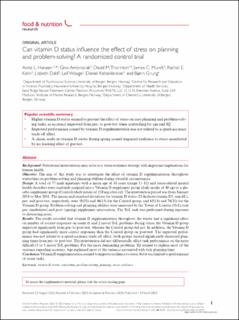| dc.contributor.author | Hansen, Anita Lill | |
| dc.contributor.author | Ambroziak, Gina | |
| dc.contributor.author | Thornton, David Malcolm | |
| dc.contributor.author | Mundt, James C. | |
| dc.contributor.author | Kahn, Rachel E. | |
| dc.contributor.author | Dahl, Lisbeth | |
| dc.contributor.author | Waage, Leif | |
| dc.contributor.author | Kattenbraker, Daniel | |
| dc.contributor.author | Grung, Bjørn | |
| dc.date.accessioned | 2023-10-17T07:48:26Z | |
| dc.date.available | 2023-10-17T07:48:26Z | |
| dc.date.created | 2023-05-09T14:41:35Z | |
| dc.date.issued | 2023 | |
| dc.identifier.citation | Food & Nutrition Research (FNR). 2023, 67 . | |
| dc.identifier.issn | 1654-6628 | |
| dc.identifier.uri | https://hdl.handle.net/11250/3096869 | |
| dc.description.abstract | Background: Nutritional interventions may serve as a stress resilience strategy with important implications for human health.Objective: The aim of this study was to investigate the effect of vitamin D supplementation throughout wintertime on problem-solving and planning abilities during stressful circumstances.Design: A total of 77 male inpatients with a mean age of 48 years (range 31–81) and stress-related mental health disorders were randomly assigned into a Vitamin D supplement group (daily intake of 40 μg) or a pla-cebo supplement group (Control) (daily intake of 120 mg olive oil). The intervention period was from January 2018 to May 2018. The means and standard deviations for vitamin D status (25-hydroxyvitamin D3, nmol/L), pre- and post-test, respectively, were 58(21) and 46(15) for the Control group, and 63(18) and 76(21) for the Vitamin D group. Problem-solving and planning abilities were measured by the Tower of London (ToL) task pre- (midwinter) and post- (spring) supplement intervention. The ToL task was performed during exposure to distracting noise.Results: The results revealed that vitamin D supplementation throughout the winter had a significant effect on number of correct responses on easier (1 and 2 move) ToL problems during stress; the Vitamin D group improved significantly from pre- to post-test, whereas the Control group did not. In addition, the Vitamin D group had significantly more correct responses than the Control group on post-test. The improved perfor-mance was not related to a speed-accuracy trade off effect; both groups showed significantly decreased plan-ning times from pre- to post-test. The intervention did not differentially affect task performance on the more difficult (3 to 5 move) ToL problems. For the more demanding problems, IQ seemed to explain most of the variance regarding accuracy. Age explained most of the variance associated with task planning time.Conclusion: Vitamin D supplementation seemed to improve resilience to stress, but it was limited to performance of easier tasks. | |
| dc.language.iso | eng | |
| dc.title | Can vitamin D status influence the effect of stress on planning and problem-solving? A randomized control trial | |
| dc.title.alternative | Can vitamin D status influence the effect of stress on planning and problem-solving? A randomized control trial | |
| dc.type | Peer reviewed | |
| dc.type | Journal article | |
| dc.description.version | publishedVersion | |
| dc.source.pagenumber | 13 | |
| dc.source.volume | 67 | |
| dc.source.journal | Food & Nutrition Research (FNR) | |
| dc.identifier.doi | 10.29219/fnr.v67.8970 | |
| dc.identifier.cristin | 2146503 | |
| cristin.ispublished | true | |
| cristin.fulltext | original | |
| cristin.qualitycode | 1 | |
